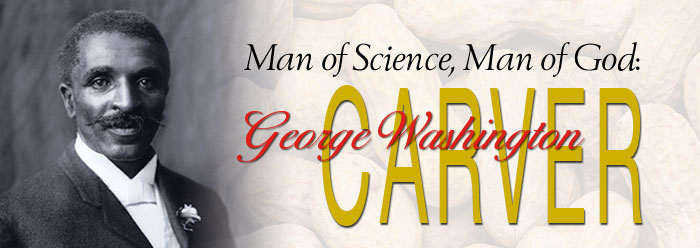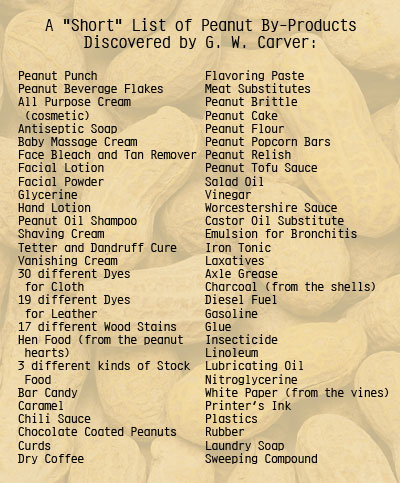
.................................................................................................................................................
Man of Science, Man of
God
.
BY CHRISTINE DAO
Who: George
Washington Carver
What: Father of Modern Agriculture
When: 1864 or 1865 - January 5, 1943
Where: Diamond Grove, Missouri
What: Father of Modern Agriculture
When: 1864 or 1865 - January 5, 1943
Where: Diamond Grove, Missouri
He was born towards
the end of the Civil War to a slave family on the farm of Moses Carver.
As an infant, he
and his mother and sister were kidnapped by Kentucky night raiders.
It's unclear what
happened to his mother and sister, but George was rescued and returned to the
Carvers, who raised him and his brother James.
He grew up in a
deeply segregated world, and very few black schools were available in the
South.
But his desire for
learning prompted him to persevere, and he earned his diploma from Minneapolis
High School in Minneapolis, Kansas.
In 1891, he
transferred to Iowa State Agriculture College in Ames (now Iowa State
University) to study botany, where he was the first black student and later the
first black faculty member.
While there, he
adopted the middle name "Washington" to distinguish himself from
another George Carver.
He received his
undergraduate degree in 1894 and his masters in 1896, and became a nationally
recognized botanist for his work in plant pathology and mycology.
After receiving his
masters, he joined Booker T. Washington at the Tuskegee Normal and Industrial
Institute (later Tuskegee University) in Alabama to teach former slaves how to
farm for self-sufficiency.
He discovered over
100 uses for the sweet potato and 300 uses for the peanut, including beverages,
cosmetics, dyes and paints, medicines, and food products.
He conducted
numerous research projects that also contributed to medicine and other fields,
and used his influence to champion the relief of racial tensions.
 He was offered many
honors and substantial wealth from patents, but Carver chose not to patent his
discoveries: "One reason I never patent my products is that if I did it
would take so much time, I would get nothing else done. But mainly I don't want
my discoveries to benefit specific favored persons."
He was offered many
honors and substantial wealth from patents, but Carver chose not to patent his
discoveries: "One reason I never patent my products is that if I did it
would take so much time, I would get nothing else done. But mainly I don't want
my discoveries to benefit specific favored persons."
Frugal in finance
and humble in character, Carver was undoubtedly a deeply devoted Christian.
He attributed
inspiration of his work to God, and his studies of nature convinced him of
the existence and benevolence of the Creator: "Never since have I been
without this consciousness of the Creator speaking to me….The out of doors has
been to me more and more a great cathedral in which God could be continuously
spoken to and heard from."
Carver died January
5, 1943 of complications from injuries he incurred in a bad fall.
His life savings of
60,000 dollars was donated to the museum and foundation bearing his name.
The epitaph on his
grave on the Tuskegee University campus summarizes the life and character of
this former slave, man of science, and man of God: “He could have added
fortune to fame, but caring for neither, he found happiness and honor in being
helpful to the world.”
Carver is quoted as
saying, "I never have to grope for methods. The method is revealed at
the moment I am inspired to create something new. Without God to draw aside the
curtain I would be helpless." Federer, W. J. 1994. America's
God and Country Encyclopedia of Quotations. Coppell, TX: FAME Publishing,
96.
* Ms. Dao is
Assistant Editor.
The
Institute for Creation Research (ICR) wants people to know that God’s Word
can be trusted in everything it speaks about—from how and why we were made, to
how the universe was formed, to how we can know God and receive all He has
planned for us.
After
50 years of ministry, ICR remains a leader in scientific research within the
context of biblical creation. Founded by Dr. Henry Morris in 1970, ICR exists
to conduct scientific research within the realms of origins and Earth history,
and then to educate the public both formally and informally through
professional training programs, through conferences and seminars around the
country, and through books, magazines, and media presentations.
No comments:
Post a Comment